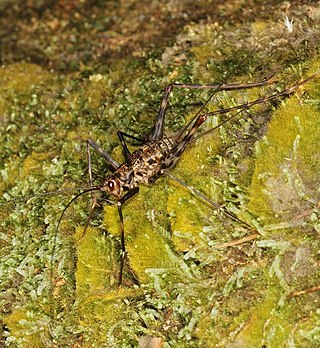
The family Gryllidae contains the subfamilies and genera which entomologists now term true crickets. Having long, whip-like antennae, they belong to the Orthopteran suborder Ensifera, which has been greatly reduced in the last 100 years : taxa such as the tree crickets, spider-crickets and their allies, sword-tail crickets, wood or ground crickets and scaly crickets have been moved or elevated to family level. The type genus is Gryllus and the first use of the family name "Gryllidae" was by Francis Walker.

Gryllinae, or field crickets, are a subfamily of insects in the order Orthoptera and the family Gryllidae.

Gryllacrididae are a family of non-jumping insects in the suborder Ensifera occurring worldwide, known commonly as leaf-rolling crickets or raspy crickets. The family historically has been broadly defined to include what are presently several other families, such as Stenopelmatidae and Rhaphidophoridae, now considered separate. As presently defined, the family contains two subfamilies: Gryllacridinae and Hyperbaeninae. They are commonly wingless and nocturnal. In the daytime, most species rest in shelters made from folded leaves sewn with silk. Some species use silk to burrow in sand, earth or wood. Raspy crickets evolved the ability to produce silk independently from other insects, but their silk has many convergent features to silkworm silk, being made of long, repetitive proteins with an extended beta-sheet structure.

Phalangopsinae, occasionally known as spider crickets, are a subfamily of crickets in the family Phalangopsidae. Members of Phalangopsinae are found worldwide in tropical and subtropical regions. Most species in the subfamily are nocturnal and can be found in rocky areas, near fallen wood, and the understory of forests. Some species are gregarious, gathering in large numbers.
Agryllus is a genus of cricket in subfamily Gryllinae, with species records from China, Indochina and Java.

Podoscirtinae is a subfamily of crickets in the family Oecanthidae.
Neoxizicus is a monotypic genus of Asian bush crickets belonging to the tribe Meconematini in the subfamily Meconematinae. It is only found in Vietnam.

The Phalangopsidae, which includes the "spider crickets" and their allies, are a recently (2014) reconstituted family of crickets, based on the type genus PhalangopsisServille, 1831 from South America. Priority for family-group names based on this genus dates from Blanchard's "Phalangopsites".
The Phaloriinae is a subfamily of crickets of the family Phalangopsidae. Species are terrestrial and are distributed in: Africa, tropical Asia, Korea, Australia and the Pacific Islands.
Trellius is an Asian genus of crickets in the family Phalangopsidae, subfamily Phaloriinae, tribe Phaloriini.
The Landrevinae are a subfamily of crickets, in the family Gryllidae, based on the type genus Landreva. They are terrestrial, omnivorous and may be known as "bark crickets"; genera are distributed in: Central and South America, Africa, tropical Asia, Korea, Japan, Australia and the Pacific Islands.
Microtachycines is a genus of cave or camel crickets in the subfamily Aemodogryllinae and tribe Aemodogryllini. The type species name M. tamdaonensis is based on specimens found in Tam Dao National Park in Vietnam.
Tamdaotettix is a genus of cave or camel crickets in the subfamily Aemodogryllinae and tribe Diestramimini. Originating in Asia, species have been found in the Indo-China region.
Megadiestramima is a genus of cave or camel crickets in the subfamily Aemodogryllinae and tribe Diestramimini. Originating in Asia, species have been found in the Indo-China region.
Sclerogryllus is an Asian genus of crickets, typical of the tribe Sclerogryllini.

Sonotrella is a genus of crickets in the subfamily Podoscirtinae and tribe Podoscirtini. Species have been recorded in: southern China, Indo-China and west Malesia.
Zvenella is a genus of crickets in the tribe Podoscirtini. Species have been recorded in: southern China, Indochina and Sumatra.
Trelleora is a genus of crickets in the tribe Podoscirtini. Species have been recorded in: India, southern China and Indochina.
Svistella is an Asian genus of "sword-tail crickets", in the subfamily Trigonidiinae and has now been assigned to the tribe Trigonidiini.

The Oecanthidae are a recently (2022) restored family of crickets based on the type genus OecanthusServille, 1831. They include "tree crickets", "anomalous crickets" and "bush crickets" and can be found in warmer parts of most of the world.






